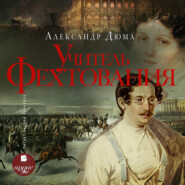По всем вопросам обращайтесь на: info@litportal.ru
(©) 2003-2024.
✖
The Royal Life Guard; or, the flight of the royal family.
Настройки чтения
Размер шрифта
Высота строк
Поля
A strange phenomenon took place: Mother Billet rose on her pillow, slowly held out her arms over the girl's head and the boy, and with a mighty effort, said:
"Bless you, my children!"
She fell back, dead. Her eyes remained open, as though she longed to see her daughter from beyond the grave from not having seen enough of her before.
CHAPTER XXXI.
FORTIER EXECUTES HIS THREAT
Catherine piously closed her mother's eyes, with her hand and then with her lips, while Mother Clement lit the candles and arranged other paraphernalia.
Pitou took charge of the other details. Reluctant to visit Father Fortier, with whom he stood on delicate ground, he ordered the mortuary mass of the sacristan, and engaged the gravedigger and the coffin-bearers.
Then he went over to Haramont to have his company of militia notified that the wife of the Hero of the People would be buried at eleven on the morrow. It was not an official order but an invitation. But it was too well known what Billet had done for this Revolution which was turning all heads and enflaming all hearts; what danger Billet was even then running for the sake of the masses – for this invitation not to be regarded as an order: all the volunteer soldiers promised their captain that they would be punctual.
Pitou brought the joiner with him, who carried the coffin. He had all the heartfelt delicacy rare in the lowborn, and hid the man and his bier in the outhouse so Catherine should not see it, and to spare her from hearing the sound of the hammering of the nails, he entered the dwelling alone.
Catherine was still praying by the dead, which had been shrouded by two neighbors.
Pitou suggested that she should go out for a change of air; then for the child's sake, upon which she proposed he should take the little one. She must have had great confidence in Pitou to trust her boy to him for a time.
"He won't come," reported Pitou, presently. "He is crying."
She kissed her mother, took her child by the hand and walked away with Pitou. The joiner carried in the coffin when she was gone.
He took her out on the road to Boursonnes, where she went half a league without saying a word to Pitou, listening to the voices of the woodland which talked to her heart.
When she got home, the work was done, and she understood why Ange had insisted on her going out. She thanked him with an eloquent look. She prayed for a long while by the coffin, understanding now that she had but one of the two friends, left, her mother and Pitou, when Isidore died.
"You must come away," said the peasant, "or I must go and hire a nurse for Master Isidore."
"You are right, Pitou," she said. "My God, how good Thou art to me – and how I love you, Pitou!"
He reeled and nearly fell over backwards. He leaned up against the wall, choking, for Catherine had said that she loved him! He did not deceive himself about the kind of love, but any kind was a great deal for him.
Finishing her prayer, she rose and went with a slow step to lean on his shoulder. He put his arm round her to sustain her; she allowed this. Turning at the door, she breathed: "Farewell, mother!" and went forth.
Pitou stopped her at her own door. She began to understand Pitou.
"Why, Miss Catherine," he stammered, "do you not think it is a good time to leave the farm?"
"I shall only leave when my mother shall no longer be here," she replied.
She spoke with such firmness that he saw it was an irrevocable resolve.
"When you do go, you know you have two homes, Father Clovis' and my house."
Pitou's "house" was his sitting room and bedroom.
"I thank you," she replied, her smile and nod meaning that she accepted both offers.
She went into her room without troubling about the young man, who had the knack of finding some burrow.
At ten next day all the farmers for miles around flocked to the farm. The Mayor came, too. At half after ten up marched the Haramont National Guards, with colors tied up in black, without a man being missing. Catherine, dressed in black, with her boy in mourning, welcomed all comers and it must be said that there was no feeling for her but of respect.
At eleven, some three hundred persons were gathered at the farm. The priest and his attendants alone were absent. Pitou knew Father Fortier and he guessed that he who had refused the sacraments to the dying woman, would withhold the funeral service under the pretext that she had died unconscious. These reflections, confided to Mayor Longpre, produced a doleful impression. While they were looking at each other in silence, Maniquet, whose opinions were anti-religious, called out:
"If Abbé Fortier does not like to say mass, we will get on without it."
But it was evidently a bold act, although Voltaire and Rousseau were in the ascendancy.
"Gentlemen," suggested the mayor, "let us proceed to Villers Cotterets where we will have an explanation."
The procession moved slowly past Catherine and her little boy, and was going down the road, when the rear guards heard a voice behind them. It was a call and they turned.
A man on a horse was riding from the side of Paris.
Part of the rider's face was covered with black bandages; he waved his hat in his hand and signalled that he wanted the party to stop.
Pitou had turned like the others.
"Why, it is Billet," he said, "good! I should not like to be in Father Fortier's skin."
At the name everybody halted. He advanced rapidly and as he neared all were able to recognize him as Pitou had done.
On reaching the head of the line, Billet jumped off his horse, threw the bridle on its neck, and, after saying a lusty: "Good day and thank ye, citizens!" he took his proper place which Pitou had in his absence held to lead the mourners.
A stable boy took away the horse.
Everybody looked curiously at the farmer. He had grown thinner and much paler. Part of his face and around his left eye had retained the black and blue tint of extravasated blood. His clenched teeth and frowning brows indicated sullen rage which waited the time for a vent.
"Do you know what has happened?" inquired Pitou.
"I know all," was the reply.
As soon as Gilbert had told his patient of the state of his wife, he had taken a cabriolet as far as Nanteuil. As the horse could go no farther, though Billet was weak, he had mounted a post horse and with a change at Levignan, he reached his farm as we know.
In two words Mother Clement had told the story. He remounted the horse and stopped the procession which he descried on turning a wall.
Silent and moody before, the party became more so since this figure of hate led the way.
At Villers Cotterets a waiting party fell into the line. As the cortege went up the street, men, women and children flowed out of the dwellings, saluted Billet, who nodded, and incorporated themselves in the ranks.
It numbered five hundred when it reached the church. It was shut, as Pitou had anticipated. They halted at the door.
Billet had become livid; his expression had grown more and more threatening.
The church and the town hall adjoined. The player of the bassoon in the holy building was also janitor at the mayor's, so that he belonged under the secular and the clerical arm. Questioned by Mayor Longpre, he answered that Father Fortier had forbidden any retainer of the church to lend his aid to the funeral. The mayor asked where the keys were, and was told the beadle had them.
"Bless you, my children!"
She fell back, dead. Her eyes remained open, as though she longed to see her daughter from beyond the grave from not having seen enough of her before.
CHAPTER XXXI.
FORTIER EXECUTES HIS THREAT
Catherine piously closed her mother's eyes, with her hand and then with her lips, while Mother Clement lit the candles and arranged other paraphernalia.
Pitou took charge of the other details. Reluctant to visit Father Fortier, with whom he stood on delicate ground, he ordered the mortuary mass of the sacristan, and engaged the gravedigger and the coffin-bearers.
Then he went over to Haramont to have his company of militia notified that the wife of the Hero of the People would be buried at eleven on the morrow. It was not an official order but an invitation. But it was too well known what Billet had done for this Revolution which was turning all heads and enflaming all hearts; what danger Billet was even then running for the sake of the masses – for this invitation not to be regarded as an order: all the volunteer soldiers promised their captain that they would be punctual.
Pitou brought the joiner with him, who carried the coffin. He had all the heartfelt delicacy rare in the lowborn, and hid the man and his bier in the outhouse so Catherine should not see it, and to spare her from hearing the sound of the hammering of the nails, he entered the dwelling alone.
Catherine was still praying by the dead, which had been shrouded by two neighbors.
Pitou suggested that she should go out for a change of air; then for the child's sake, upon which she proposed he should take the little one. She must have had great confidence in Pitou to trust her boy to him for a time.
"He won't come," reported Pitou, presently. "He is crying."
She kissed her mother, took her child by the hand and walked away with Pitou. The joiner carried in the coffin when she was gone.
He took her out on the road to Boursonnes, where she went half a league without saying a word to Pitou, listening to the voices of the woodland which talked to her heart.
When she got home, the work was done, and she understood why Ange had insisted on her going out. She thanked him with an eloquent look. She prayed for a long while by the coffin, understanding now that she had but one of the two friends, left, her mother and Pitou, when Isidore died.
"You must come away," said the peasant, "or I must go and hire a nurse for Master Isidore."
"You are right, Pitou," she said. "My God, how good Thou art to me – and how I love you, Pitou!"
He reeled and nearly fell over backwards. He leaned up against the wall, choking, for Catherine had said that she loved him! He did not deceive himself about the kind of love, but any kind was a great deal for him.
Finishing her prayer, she rose and went with a slow step to lean on his shoulder. He put his arm round her to sustain her; she allowed this. Turning at the door, she breathed: "Farewell, mother!" and went forth.
Pitou stopped her at her own door. She began to understand Pitou.
"Why, Miss Catherine," he stammered, "do you not think it is a good time to leave the farm?"
"I shall only leave when my mother shall no longer be here," she replied.
She spoke with such firmness that he saw it was an irrevocable resolve.
"When you do go, you know you have two homes, Father Clovis' and my house."
Pitou's "house" was his sitting room and bedroom.
"I thank you," she replied, her smile and nod meaning that she accepted both offers.
She went into her room without troubling about the young man, who had the knack of finding some burrow.
At ten next day all the farmers for miles around flocked to the farm. The Mayor came, too. At half after ten up marched the Haramont National Guards, with colors tied up in black, without a man being missing. Catherine, dressed in black, with her boy in mourning, welcomed all comers and it must be said that there was no feeling for her but of respect.
At eleven, some three hundred persons were gathered at the farm. The priest and his attendants alone were absent. Pitou knew Father Fortier and he guessed that he who had refused the sacraments to the dying woman, would withhold the funeral service under the pretext that she had died unconscious. These reflections, confided to Mayor Longpre, produced a doleful impression. While they were looking at each other in silence, Maniquet, whose opinions were anti-religious, called out:
"If Abbé Fortier does not like to say mass, we will get on without it."
But it was evidently a bold act, although Voltaire and Rousseau were in the ascendancy.
"Gentlemen," suggested the mayor, "let us proceed to Villers Cotterets where we will have an explanation."
The procession moved slowly past Catherine and her little boy, and was going down the road, when the rear guards heard a voice behind them. It was a call and they turned.
A man on a horse was riding from the side of Paris.
Part of the rider's face was covered with black bandages; he waved his hat in his hand and signalled that he wanted the party to stop.
Pitou had turned like the others.
"Why, it is Billet," he said, "good! I should not like to be in Father Fortier's skin."
At the name everybody halted. He advanced rapidly and as he neared all were able to recognize him as Pitou had done.
On reaching the head of the line, Billet jumped off his horse, threw the bridle on its neck, and, after saying a lusty: "Good day and thank ye, citizens!" he took his proper place which Pitou had in his absence held to lead the mourners.
A stable boy took away the horse.
Everybody looked curiously at the farmer. He had grown thinner and much paler. Part of his face and around his left eye had retained the black and blue tint of extravasated blood. His clenched teeth and frowning brows indicated sullen rage which waited the time for a vent.
"Do you know what has happened?" inquired Pitou.
"I know all," was the reply.
As soon as Gilbert had told his patient of the state of his wife, he had taken a cabriolet as far as Nanteuil. As the horse could go no farther, though Billet was weak, he had mounted a post horse and with a change at Levignan, he reached his farm as we know.
In two words Mother Clement had told the story. He remounted the horse and stopped the procession which he descried on turning a wall.
Silent and moody before, the party became more so since this figure of hate led the way.
At Villers Cotterets a waiting party fell into the line. As the cortege went up the street, men, women and children flowed out of the dwellings, saluted Billet, who nodded, and incorporated themselves in the ranks.
It numbered five hundred when it reached the church. It was shut, as Pitou had anticipated. They halted at the door.
Billet had become livid; his expression had grown more and more threatening.
The church and the town hall adjoined. The player of the bassoon in the holy building was also janitor at the mayor's, so that he belonged under the secular and the clerical arm. Questioned by Mayor Longpre, he answered that Father Fortier had forbidden any retainer of the church to lend his aid to the funeral. The mayor asked where the keys were, and was told the beadle had them.

















